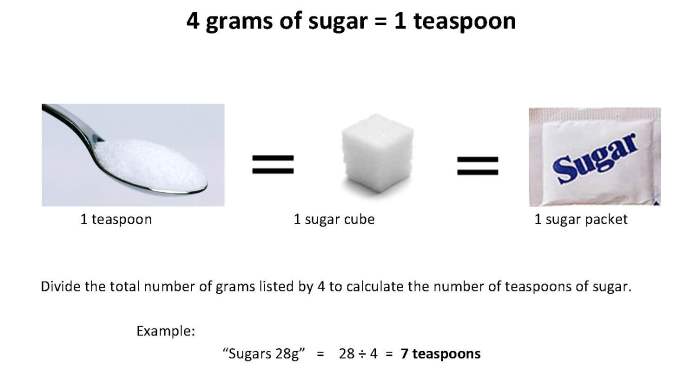Glycemic Index and Impact on Blood Sugar

1 tsp of sugar nutrition facts – Let’s delve into how that seemingly insignificant teaspoon of sugar impacts your blood sugar levels. We’ll explore the glycemic index, the body’s response to sugar, and compare it to other sweeteners.Granulated white sugar boasts a very high glycemic index (GI), typically around 100. The GI is a measure of how quickly a carbohydrate-containing food raises blood glucose levels after consumption.
A single teaspoon of sugar, a seemingly innocuous quantity, packs a surprisingly significant caloric punch. Understanding its nutritional profile necessitates a comparative analysis, perhaps considering the contrasting properties of fats, as found in the nutrition facts of sunflower oil , to fully appreciate the impact of simple sugars on overall dietary intake. Returning to the teaspoon of sugar, its rapid absorption highlights the need for mindful consumption within a balanced diet.
A higher GI means a faster and more significant rise.
Sugar Digestion and Absorption
When you consume that teaspoon of sugar, your body swiftly gets to work. The sugar, primarily sucrose, is broken down in your small intestine by an enzyme called sucrase into its constituent parts: glucose and fructose. These simpler sugars are then absorbed into your bloodstream. This rapid absorption is a key factor in sugar’s high GI. The glucose enters the bloodstream directly, causing a rapid spike in blood glucose levels.
The liver then processes the fructose, which also contributes to blood sugar, though often slightly more slowly than glucose. The speed of this entire process explains why sugar leads to a quick and pronounced rise in blood glucose.
Glycemic Response of Sugar Compared to Other Sweeteners, 1 tsp of sugar nutrition facts
The glycemic response to 1 teaspoon of sugar differs significantly from that of other sweeteners. Honey, for instance, while still containing a significant amount of sugars, has a lower GI than pure sucrose due to the presence of other carbohydrates and compounds. Similarly, maple syrup, also a complex mixture of sugars, has a lower GI than white sugar. The presence of fructose, which is metabolized differently, plays a role in the glycemic response of both honey and maple syrup.
For example, a teaspoon of honey might raise blood glucose levels more slowly and to a lesser extent than a teaspoon of granulated sugar. The exact difference varies depending on the type of honey and maple syrup. However, it’s safe to say that refined sugar, in its pure form, will consistently elicit the fastest and most significant blood sugar spike.
Potential Health Implications of Sugar Consumption

Even a seemingly small amount of sugar, like that single teaspoon, can contribute to significant health problems if consumed regularly. While a single teaspoon won’t instantly cause harm, consistent daily intake adds up, increasing your risk for various chronic diseases. This section explores the potential negative health consequences associated with regular sugar consumption.
Added Sugar and Chronic Diseases
Regular consumption of added sugar is strongly linked to the development of several chronic diseases. The excess calories from sugar contribute to weight gain and obesity, a major risk factor for type 2 diabetes. Furthermore, high sugar intake can lead to insulin resistance, making it harder for your body to regulate blood sugar levels, further increasing your diabetes risk.
High sugar diets are also associated with an increased risk of cardiovascular disease, potentially through mechanisms like inflammation and the development of harmful blood fats. Studies consistently demonstrate a correlation between high added sugar intake and an increased risk of heart attack and stroke.
Sugar’s Impact on Dental Health
Sugar feeds the bacteria in your mouth, producing acids that erode tooth enamel. This process, known as tooth decay or cavities, can lead to pain, infection, and even tooth loss. The frequency of sugar consumption is as important as the total amount; frequent snacking on sugary foods and drinks keeps the bacteria constantly active, increasing the risk of cavities significantly.
Regular brushing and flossing, along with limiting sugary foods and drinks, are crucial for maintaining good oral health.
Infographic: Sugar Intake and Health Outcomes
Imagine a simple infographic with three columns. The first column shows increasing levels of daily sugar intake, represented by teaspoons: 1 tsp, 4 tsp, 8 tsp. The second column illustrates corresponding health outcomes. For 1 tsp, a small, green upward-pointing arrow indicates a minimal impact. For 4 tsp, a larger, yellow arrow pointing both up and down indicates mixed effects – potential weight gain and increased risk of minor health issues.
For 8 tsp, a large, red downward-pointing arrow symbolizes a significant negative impact, showing increased risk of obesity, type 2 diabetes, and heart disease. The third column displays visual representations of these outcomes – a healthy-looking person for 1 tsp, a slightly overweight person for 4 tsp, and an individual showing clear signs of ill health for 8 tsp.
This visual representation clearly demonstrates the escalating health risks associated with increasing sugar consumption.
Commonly Asked Questions: 1 Tsp Of Sugar Nutrition Facts
What is the difference between granulated sugar and brown sugar nutritionally?
Brown sugar contains molasses, which adds a small amount of minerals and a slightly lower glycemic index compared to granulated white sugar. However, the nutritional difference is minimal.
Does the type of sugar affect tooth decay?
All sugars contribute to tooth decay. The frequency of sugar consumption is more significant than the type of sugar itself.
Is it okay to consume 1 teaspoon of sugar daily?
It depends on your overall diet and health goals. Most dietary guidelines recommend limiting added sugar intake significantly, and 1 teaspoon daily may still exceed those recommendations for some individuals.
What are some natural alternatives to refined sugar?
Consider using stevia, honey, maple syrup, or fruit in moderation as natural sweeteners. However, remember these also contain calories and carbohydrates.
